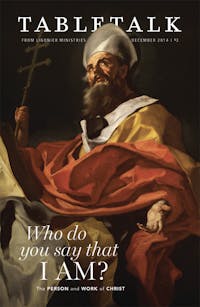
Request your free, three-month trial to Tabletalk magazine. You’ll receive the print issue monthly and gain immediate digital access to decades of archives. This trial is risk-free. No credit card required.
Try Tabletalk NowAlready receive Tabletalk magazine every month?
Verify your email address to gain unlimited access.
“We all unanimously teach that our Lord Jesus Christ is to us one and the same Son, the self-same perfect in Godhead, the self-same perfect in manhood; truly God and truly man . . . acknowledged in two natures, unconfusedly, unchangeably, indivisibly, inseparably . . . the properties of each nature being preserved.”
So wrote the church fathers in the Definition of Chalcedon in AD 451. But even if they spoke “unanimously,” their doctrine of Christ sounds so complex. Does it really matter?
Given the sacrifices they made to describe Christ rightly, one can imagine that if these Christians were present at a group Bible study on Philippians 2:5–11, they might well say to us, “From what we have heard, it never mattered more.”
Imagine the discussion on “Though he was in the form of God . . . emptied himself” (Phil. 2:6–7, RSV). Says one: “It means Jesus became a man for a time and then went back to being God afterwards.” “No,” says another, “He only emptied himself of His divine attributes and then He took them up again.” “Surely,” says another (not pausing to reflect on the miracles of Moses, Elijah, or the Apostles), “He mixed humanity with His deity—isn’t that how He was able to do miracles?”
Does it really matter if those views are wrong, indeed heretical, so long as we know that Jesus saves and we witness to others about Him? After all, the important thing is that we preach the gospel.
But that is precisely the point—Jesus Christ Himself is the gospel. Like loose threads in a tapestry—pull on any of these views, and the entire gospel will unravel. If the Christ we trust and preach is not qualified to save us, we have a false Christ.
Reflect for a moment on the descriptions of Christ above. If at any point He ceased to be all that He is as God, the cosmos would disintegrate—for He is the One who upholds the universe by the word of His power (Heb. 1:3). If He were a mixture of deity and humanity, then He would not be truly or fully human, and therefore would no longer be one of us and able to act as our representative and substitute. He could neither save sinners nor succor saints. This is why Hebrews emphasizes that Christ possesses a humanity identical to ours, apart from sin. No mixing or confusing here.
Most of us are sticklers for clearly describing anything we love, be it science, computing, sports, business, or family life. Should we be indifferent to how we think and speak about our Savior and Lord?
This is why the church fathers, and later the Westminster divines, stressed that God’s Son ever remained “of one substance, and equal with the Father” and yet, in the incarnation, took “upon him man’s nature, with all the essential properties and infirmities thereof, yet without sin. . . . So that two whole, perfect, and distinct natures, the Godhead and the manhood, were inseparably joined together in one person, without conversion, composition, or confusion” (WCF 8.2).
What makes this statement so impressive is that it safeguards the mystery of the incarnation while carefully describing its reality. The Son’s two natures are not united to each other, but they are united in His one person. So in everything He did, He acted appropriately in terms of His deity or His humanity, one divine person exercising the powers of each nature in its own proper sphere.
This, then, underscores the value of the church’s creeds. They were written by men who had thought more deeply and often suffered more grievously than we do. They spoke out of a deep love for Christ and His people, concerned for a lost world. Their testimony helps us in three ways:
- It protects us by setting boundaries for our thinking.
- It instructs us by helping us see biblical truth expressed in its briefest form.
- It unites us, so that everywhere in the world, Christians can share the same clear confession of who Christ is and what He has done.
Does it really matter? In light of the sacrifices our forefathers made in order to articulate the grandeur of the person of our Savior and what Christ had to be in order to save us, you bet it matters.
